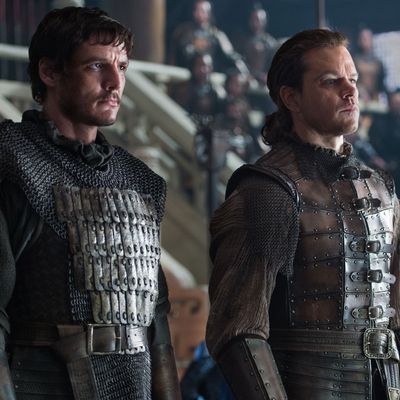
When The Great Wall is released on Friday, audiences everywhere will get to see Matt Damon protect the Great Wall of China from an army of gnarly monsters. It’s a goofy premise, but since the movie’s first trailer, it’s been the subject of controversy over its white-savior narrative, a story in which one heroic white man saves the day for people of color. As a result, Damon has spent much of his press tour for the film defending it, and begging us to believe he’s not the bad guy here. Here’s how it’s gone.
July 28, 2016: After the film makes it through production unmarked by controversy, the first Great Wall teaser sets off the white-savior debate in earnest.
July 29, 2016: Fresh Off the Boat star Constance Wu slams Damon’s casting on Twitter: “We have to stop perpetuating the racist myth that [only a] white man can save the world,” Wu writes. In subsequent tweets, Wu clarifies that she wasn’t blaming Damon or the studio, but only posted her message to spread awareness about how often Asian identities are erased. Others, including Shonda Rhimes and Kerry Washington, praise her comments.
August 2, 2016: Shortly after Wu’s critique, The Atlantic’s David Sims posts a longer take. Sims revisits Damon’s earlier Project Greenlight imbroglio, in which the actor lectured Effie Brown, a black woman producer with years of experience in Hollywood, about how to fix the industry’s diversity problem. “Damon is, by all accounts, a well-meaning guy with left-leaning politics, but he’s already once been embroiled in a debate over Hollywood’s institutional racism after a much-discussed episode of his HBO filmmaking show Project Greenlight,” Sims writes. “Now, less than a year later, the man who lectured the African-American producer Effie Brown over the limits of diversity in Hollywood is the face of a film that embodies all of the industry’s worst tendencies, by yet again putting a white American actor at the center of another culture’s story.” Matt Damon, an Atlantic reader, is not happy about this piece in particular — more on this later.
August 4, 2016: Director Zhang Yimou defends The Great Wall and Damon’s casting. He says the movie’s narrative couldn’t be further from a white-savior story: “For the first time, a film deeply rooted in Chinese culture, with one of the largest Chinese casts ever assembled, is being made at [a] tentpole scale for a world audience,” Yimou says, explaining that Damon’s character was always intended to be white. “Matt Damon is not playing a role that was originally conceived for a Chinese actor. The arrival of his character in our story is an important plot point. There are five major heroes in our story and he is one of them — the other four are all Chinese,” Yimou says in a statement to Entertainment Weekly. It’s a conflation of two separate yet related issues — white-savior stories and whitewashing — that will pop up again.
October 8, 2016: After a panel New York City’s Comic Con, Damon calls the race-based criticism of the movie “a fucking bummer.” The actor says he was particularly irked by that Atlantic piece: “I was like, ‘Really, guys?’ To me whitewashing was when Chuck Connors played Geronimo,” he says, conflating whitewashing with white-savior stories. “There are far more nuanced versions of it and I do try to be sensitive to that, but [Great Wall co-star] Pedro Pascal called me and goes, ‘Yeah, we are guilty of whitewashing. We all know only the Chinese defended the wall against the monster attack,’” Damon jokes.
December 6, 2016: As “fake news” becomes a postelection buzzword, Damon employs it as a Great Wall defense. “[The whitewashing news] suddenly becomes a story because people click on it, versus the traditional ways that a story would get vetted before it would get to that point,” he tells the Associated Press. “It’s a monster movie and it’s a historical fantasy and I didn’t take a role away from a Chinese actor … it wasn’t altered because of me in any way.” In the same interview, Damon tries to appease critics skeptical of the movie’s treatment of Chinese culture. “Although it was developed for commercial purposes, I felt there was room for me to play and put many elements of Chinese culture into it,” he says.
February 13, 2017: An NBC reporter brings up the whitewashing controversy in an interview with Damon, linking it to a larger effort to diversify the industry. “I think there are two different conversations. There’s this movie and then there’s the much larger conversation [about diversity in Hollywood], which is a really important one,” Damon says. “The kerfuffle around this movie, I always felt, is why doesn’t everyone see the movie who wants to engage in that conversation, and then make a determination.” Damon blames the movie’s initial poster, which features a comically large portrait of his face, for kick-starting the controversy. “The last two movies I had come out were The Martian and Jason Bourne, and both of those movies are my face and my name and they did really well … I’ll be interested in people see the movie and realize that the whole idea is that it’s an East meets West co-production.”


